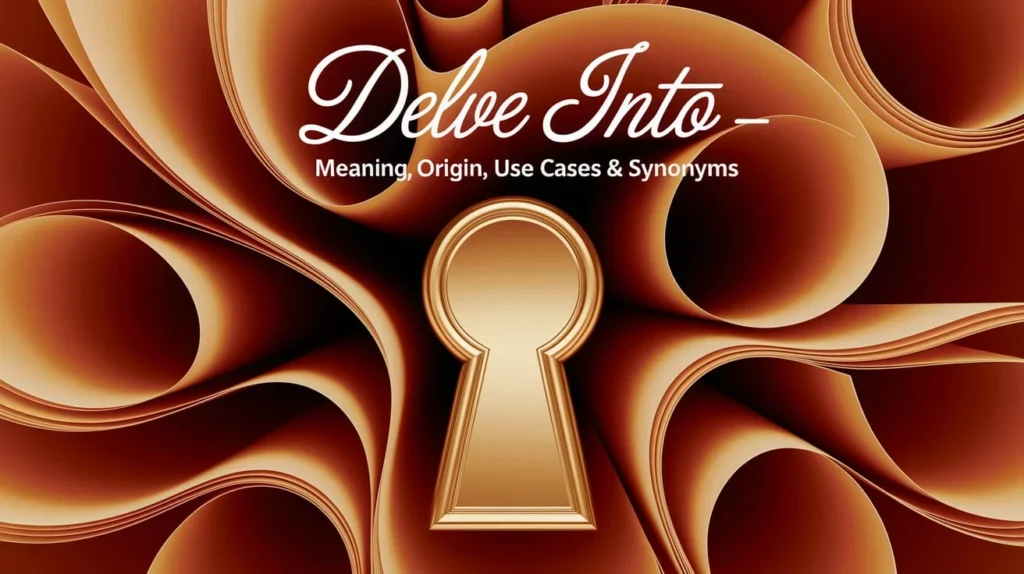Why do we choose to ‘delve into’ something instead of simply scratching the surface? This phrase has become a staple in daily language, whether we’re talking about digging into our hobbies, studying for an exam, or getting to the heart of a complex issue.
The desire to explore deeply is ingrained in human nature, and “delve into” captures that need perfectly. Whether in personal conversations or professional research, this phrase suggests more than a passing interest—it indicates a serious, thoughtful, and thorough examination.
In this article, we’ll explore the meaning, origin, use cases, and synonyms of the phrase “delve into,” making sure you gain a full understanding of why and how this expression is used. By the end, you’ll be able to use it confidently and recognize its nuanced applications in various contexts.
Meaning of “Delve Into”
At its core, the phrase “delve into” means to examine something in depth, to investigate thoroughly or explore a topic, concept, or situation with great attention to detail. It’s often used when someone seeks to go beyond surface-level knowledge and understand or uncover the hidden layers of a subject.
Primary Definition
The expression carries a connotation of deep exploration. In its most basic sense, it refers to investigating something deeply, often in a manner that involves critical thinking, focus, and sometimes, digging for hidden insights. It’s frequently associated with topics that require thorough research, analysis, or consideration. For example:
- “The researcher delved into the ancient manuscripts to uncover lost knowledge.”
- “Before making any decisions, I want to delve into the facts.”
In these examples, delving goes beyond just reading or skimming; it’s a commitment to fully understanding the subject.
Broader Contextual Meaning
“Delving into” can apply to both literal and figurative investigations. While it originally referred to physical digging (like searching through soil or rocks), today it’s just as likely to refer to an intellectual or emotional exploration.
- In an emotional context, “delve into” might describe someone examining their thoughts or feelings in great detail. For example, “He delved into his past to understand his current fears.”
- In a mental context, it could describe research or intellectual analysis. For instance, “The historian delved into the documents to understand the cultural significance of the era.”
In both uses, the phrase suggests intensity and commitment to discovering truths that might not be immediately apparent.
Subtle Differences
It’s important to distinguish “delve into” from other common expressions such as “look into,” “examine,” or “investigate.” While all these terms imply some form of inquiry, “delve into” often carries a stronger sense of depth and effort. Here’s a breakdown:
- Look into: This usually implies a surface-level examination, often less thorough than delving into something. “I’ll look into it” is often said when one intends to investigate but might not dive too deeply.
- Examine: While this is similar to delving into something, examine can sometimes carry a more methodical or clinical tone, typically associated with scrutinizing details.
- Investigate: This is a more formal term, often used in legal or scientific contexts, and generally refers to a structured or procedural inquiry into something.
Delving vs. Searching
Another key difference is that “delve into” often implies finding meaning or discovery, while “searching” suggests looking for something specific. Delving into a topic means you are exploring the depths, while searching may simply refer to finding a specific piece of information.
Origin of “Delve Into”
To fully appreciate the depth of the phrase “delve into,” it’s crucial to understand its historical roots. Like many phrases in the English language, “delve into” evolved from physical actions to more metaphorical meanings over time.
Etymology of “Delve”
The word “delve” originates from the Old English word “delfan”, which meant to dig or excavate. It was first used in a very literal sense to describe the act of digging into the earth—uncovering buried objects or digging for something hidden beneath the surface.
- Early Usage: The term was first recorded in the 14th century and referred to physical digging, especially in the context of searching for buried treasures or digging wells.
- Metaphorical Shift: Over the centuries, the metaphorical use of “delve” began to take shape. As intellectual curiosity grew during the Renaissance and Enlightenment periods, the notion of “digging” into complex subjects gained popularity.
From Physical Digging to Intellectual Exploration
As the act of digging metaphorically extended to mental exploration, the phrase “delve into” began to be used for intellectual or emotional investigations. It represents a mental effort to “dig through” information, much like an archaeologist would uncover ancient artifacts.
This transition aligns with the development of academic disciplines, where deep, intensive study became more valued. The metaphor of digging became synonymous with the process of uncovering knowledge, insights, or understanding—things that might be hidden beneath the surface.
Use Cases of “Delve Into”
In Everyday Conversations
In day-to-day interactions, the phrase “delve into” can be a way of expressing a desire to explore something in greater depth, whether it’s a new hobby, personal interests, or even social dynamics. It often indicates a passion for understanding something thoroughly.
For example:
- Personal Exploration: “I want to delve into painting to express myself creatively.”
- Casual Conversations: “We could delve into our favorite books or movies during dinner tonight.”
In Professional and Academic Settings
In professional environments, delving into a subject signals a commitment to thorough research or understanding, often intending to improve decision-making or gain a competitive edge.
- Research Projects: “The team will need to delve into customer data to find trends and patterns.”
- Business Strategies: “Before we proceed with the marketing campaign, let’s delve into the latest consumer behavior reports.”
In academic circles, scholars “delve into” subjects of study by questioning, analyzing, and synthesizing information to develop new theories or understanding.
- History or Literature: “In this research paper, I will delve into the historical context of 19th-century French literature.”
Synonyms for “Delve Into”
While “delve into” is an effective and vivid way to describe deep inquiry, there are several synonyms that can be used depending on the context. Understanding these alternatives can help add variety and precision to your language.
Explore
“Explore” is the most common synonym and suggests a broad, open-ended investigation. It is often used when there’s a sense of discovery rather than focused examination.
- Example: “Let’s explore the possibilities before making a decision.”
Examine
To examine something involves looking at it closely, often with a specific focus or purpose. It can suggest a more systematic or organized approach than “delve into.”
- Example: “He examined the data thoroughly before presenting it.”
Investigate
“Investigate” tends to be more formal and typically refers to an in-depth inquiry with an objective or factual aim, often used in legal, scientific, or journalistic contexts.
- Example: “The detectives investigated the crime scene to gather clues.”
Probe
“Probe” has a slightly more intense connotation than “delve into,” suggesting a search for hidden information or something difficult to uncover.
- Example: “The journalist probed deeper into the politician’s financial records.”
Conclusion
In summary, the phrase “delve into” conveys more than just a casual look at something—it reflects a commitment to thoroughly explore and understand. It’s used across various contexts, from personal growth to professional research, to convey a deeper intellectual curiosity. Its origin, meaning, and evolving usage showcase how language adapts to our needs for detailed understanding.
By using “delve into” thoughtfully, you can elevate your language, showing a willingness to engage with complex topics and uncover their layers. Next time you encounter a topic that fascinates you, delve into it fully—and discover the richness hidden beneath the surface.
FAQs – Delve Into – Meaning, Origin, Use Cases & Synonyms
1. What does “delve into” mean?
“Delve into” means to examine or investigate something deeply and thoroughly. It suggests a comprehensive exploration, often to uncover details or insights that aren’t immediately apparent.
2. Where did the phrase “delve into” originate?
The phrase “delve into” originated from the Old English word “delfan,” which meant to dig or excavate. Over time, the phrase shifted from its literal sense of digging into the earth to metaphorically referring to the act of deeply exploring or researching a subject.
3. Can I use “delve into” in casual conversations?
Yes! While “delve into” is often used in academic, professional, or formal contexts, it can also be used in casual conversations. For example, you might say, “I want to delve into painting as a hobby,” showing a deeper interest in the subject.
4. How does “delve into” differ from “look into”?
“Delve into” suggests a more thorough and in-depth examination compared to “look into,” which typically implies a surface-level investigation. For instance, “I’ll look into the issue” suggests a more preliminary inquiry, whereas “I’ll delve into the issue” indicates a deeper, more detailed exploration.
5. What are some synonyms for “delve into”?
Some synonyms for “delve into” include explore, examine, investigate, and probe. While all these terms imply investigation, they carry slightly different nuances:
- Explore suggests a broad or open-ended investigation.
- Examine often refers to a more focused, systematic look.
- Investigation is formal and used in scientific or legal contexts.
- Probe implies an intense, often deeper search.

Shin Kyung is a passionate numerologist and spiritual guide dedicated to exploring the profound meanings behind angel numbers. With a unique blend of intuition and research, Shin empowers readers to unlock the hidden messages from the universe and embrace their spiritual journeys.



